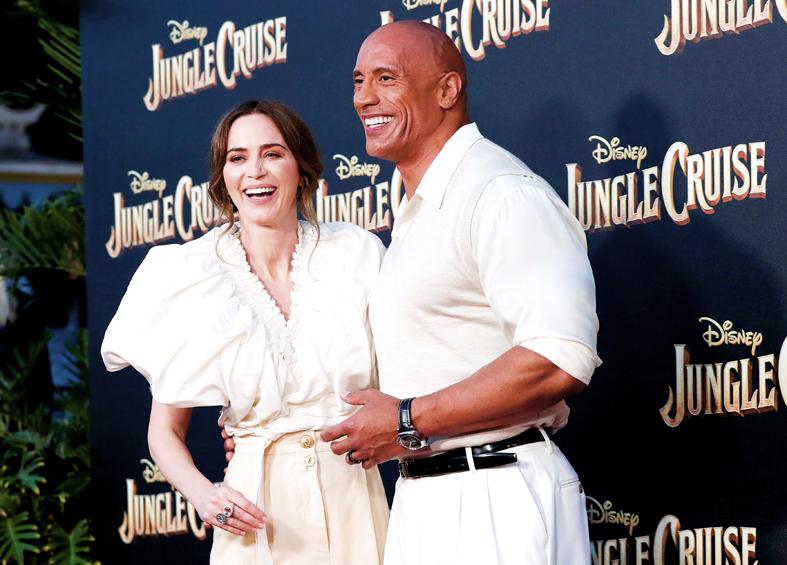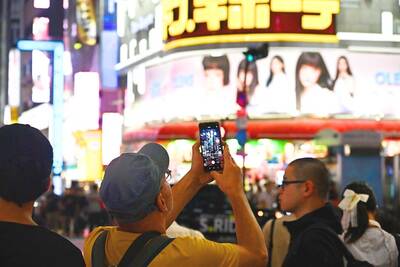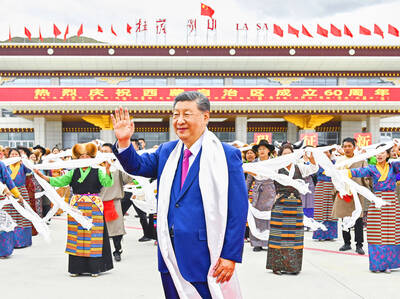Jungle Cruise, Disney’s new adventure film based on a 1950s theme park ride, has an unexpectedly modern twist — one of its main characters comes out as gay.
A scene in which Jack Whitehall’s character discusses his sexuality with Dwayne “The Rock” Johnson’s Amazon boat captain, although far from ground-breaking by modern cinema terms, is a departure for the traditionally conservative studio.
Young British fop MacGregor does not use the specific word “gay,” but explains how he broke off three engagements with women because his “interests happily lay elsewhere,” prompting skipper Frank to raise a toast to “elsewhere.”

Photo: Reuters
“I felt that the scene was really exactly what it was, which was two men talking about what they loved, and who they loved,” Johnson — the world’s top-paid movie star — told a news conference this week.
However, the exchange is likely to make waves upon the film’s release today, with each of Disney’s tiny steps toward LGBT representation in the past few years having been slammed at home and abroad — and not just by conservatives.
US evangelical group One Million Moms (1MM) organized a boycott of Toy Story 4 in 2019 for briefly depicting two moms dropping their child at school, accusing Disney of “pushing an agenda and exposing children to controversial topics.”
A fleeting lesbian kiss in Star Wars: The Rise of Skywalker was cut from versions of the film playing in Singapore and Dubai, where same-sex marriage is illegal.
However, the historic Star Wars lip-lock was also condemned by LGBT rights advocates as tokenistic — as was a brief scene in Marvel’s record-grossing Avengers: Endgame, in which an openly gay man participates in a support group.
The Jungle Cruise representation goes further — MacGregor explains he joined his scientist sister (Emily Blunt) on her expedition to Brazil because she “stood by” him while others in World War I-era London spurned him because of who he “loved.”
“It was a scene that we really wanted to get right,” said Whitehall, a British comedian-turned-actor, who is straight.
Expanding on the theme at Sunday’s world premiere in California, Whitehall told Variety that he thought the scene was “significant” and “one that we certainly thought about and talked about a lot.”
“I hope that it’s a scene that audiences enjoy and I certainly felt at the time that I was proud of the work that we’d done,” he said, adding that he hoped it would be a positive for LGBT children watching.
However, the film’s failure to use the word “gay” has already stoked criticism on social media.
“Disney will really do anything to avoid using the word ‘gay’ in its mainstream content, won’t it?” wrote Declan Cashin, a curator for Twitter.
Jeremy Blacklow, director of entertainment media at LGBT advocacy group GLAAD, said in a statement that the “heartwarming exchange” was “a powerful addition to a big budget film that will reach audiences around the world.”
However, the “scene’s innuendo makes it easy to overlook by anyone not paying close attention, or by youth who are too young to understand the reference,” he added.
GLAAD’s Studio Responsibility Index counted only 20 LGBTQ characters in films released by major studios last year, and 30 percent of those were only on screen for less than one minute.
Blacklow called on Disney to include more diverse storylines in upcoming films including Marvel superhero titles such as Eternals, and the upcoming Doctor Strange and Thor sequels.
In another example of Disney changing with the times, theme park rides in California and Florida have been altered to remove offensive depictions of Aborigines who waved spears and traded shrunken heads.

Ten cheetah cubs held in captivity since birth and destined for international wildlife trade markets have been rescued in Somaliland, a breakaway region of Somalia. They were all in stable condition despite all of them having been undernourished and limping due to being tied in captivity for months, said Laurie Marker, founder of the Cheetah Conservation Fund, which is caring for the cubs. One eight-month-old cub was unable to walk after been tied up for six months, while a five-month-old was “very malnourished [a bag of bones], with sores all over her body and full of botfly maggots which are under the

BRUSHED OFF: An ambassador to Australia previously said that Beijing does not see a reason to apologize for its naval exercises and military maneuvers in international areas China set off alarm bells in New Zealand when it dispatched powerful warships on unprecedented missions in the South Pacific without explanation, military documents showed. Beijing has spent years expanding its reach in the southern Pacific Ocean, courting island nations with new hospitals, freshly paved roads and generous offers of climate aid. However, these diplomatic efforts have increasingly been accompanied by more overt displays of military power. Three Chinese warships sailed the Tasman Sea between Australia and New Zealand in February, the first time such a task group had been sighted in those waters. “We have never seen vessels with this capability

A Japanese city would urge all smartphone users to limit screen time to two hours a day outside work or school under a proposed ordinance that includes no penalties. The limit — which would be recommended for all residents in Toyoake City — would not be binding and there would be no penalties incurred for higher usage, the draft ordinance showed. The proposal aims “to prevent excessive use of devices causing physical and mental health issues... including sleep problems,” Mayor Masafumi Koki said yesterday. The draft urges elementary-school students to avoid smartphones after 9pm, and junior-high students and older are advised not

Chinese President Xi Jinping (習近平) attended a grand ceremony in Lhasa yesterday during a rare visit to Tibet, where he urged “ethnic unity and religious harmony” in a region where China is accused of human rights abuses. The vast high-altitude area on the country’s western edge, established as an autonomous region in 1965 — six years after the 14th Dalai Lama fled into exile — was once a hotbed for protest against Chinese Communist Party rule. Rights groups accuse Beijing’s leaders of suppressing Tibetan culture and imposing massive surveillance, although authorities claim their policies have fostered stability and rapid economic development in